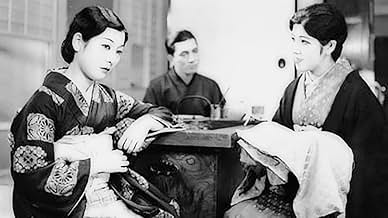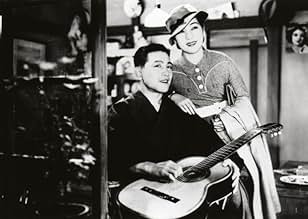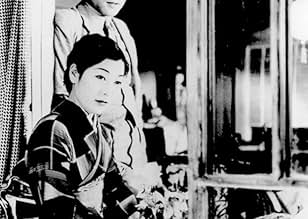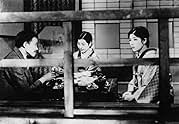Agrega una trama en tu idiomaWhen she reaches adulthood, a precocious young woman sets out to find her biological father, who, as her mother tells her, abandoned them for another woman.When she reaches adulthood, a precocious young woman sets out to find her biological father, who, as her mother tells her, abandoned them for another woman.When she reaches adulthood, a precocious young woman sets out to find her biological father, who, as her mother tells her, abandoned them for another woman.
- Dirección
- Guionistas
- Elenco
- Premios
- 1 premio ganado en total
- Dirección
- Guionistas
- Todo el elenco y el equipo
- Producción, taquilla y más en IMDbPro
Opiniones destacadas
A very dear film by the young Naruse Mikio, and the theme is what it so often is in the great Japanese cinema of the 1930s, 40s and 50s: the heart wants what it wants. The lovely daughter is played by Chiba Sachiko, and she would later marry Naruse. The wonderful Japanese actor Maruyama Sadao plays the father. Maruyama would later be exterminated in the U.S. terror bombing of Hiroshima.
A young middle-class woman sets out to a remote mountain village in Nagano to bring her estranged father back to Tokyo where his presence is needed to fulfill some pressing social obligations - chief among them a meeting between her parents and the father of her intended bridegroom. Her own father, though, would rather stay with his common law wife - a former geisha - and their two children despite their relative poverty and "disgraceful" circumstances. Father is happy prospecting for non-existent gold in the rivers of his adopted rural home, while his selfless and devoted 'wife' ekes out a living as a hairdresser.
Back in Tokyo, Etsuko, the abandoned wife and Kimiko's self-absorbed and pretentious mother publishes mournful haiku for her long lost husband and patiently waits for his return. Will Father return to his "rightful" place with his "legitimate" family or will he forsake them for his mistress and their two children? Naruse Mikio's comic and heart stirring melodrama 'Wife! Be Like a Rose' offers a surprising and refreshing take on familiar Japanese themes on 'self-sacrifice' and filial devotion.
Back in Tokyo, Etsuko, the abandoned wife and Kimiko's self-absorbed and pretentious mother publishes mournful haiku for her long lost husband and patiently waits for his return. Will Father return to his "rightful" place with his "legitimate" family or will he forsake them for his mistress and their two children? Naruse Mikio's comic and heart stirring melodrama 'Wife! Be Like a Rose' offers a surprising and refreshing take on familiar Japanese themes on 'self-sacrifice' and filial devotion.
Although not quite as famous as 1950s Japan's Golden Age of Cinema, movies from the Land of the Rising Sun in the 1930s were experiencing quite a bit of popularity in Asia. However, United States film fans were oblivious to the great works coming out of Japan until director Minoru Naruse's September 1935's "Wife! Be Like A Rose!" The now-Japanese classic finally was shown two years later in America after its initial release. An untimely New York Times' scathing review of the film put an end to its domestic showing, but other more aware critics acknowledged its innovative visuals were unique in filmmaking.
"Wife! Be Like A Rose!" has drawn parallels to films coming out of the French New Wave movement in the 1950s rather than belonging to the mid-1930s. Naruse's forte was heavily-focused on his female characters. Its plot centers around a daughter, Kimiko (Sachiko), about to get married. Her father had left the family 15 years earlier and remarried a geisha woman in the countryside. Kimiko hopes to get her father to walk her down the aisle at her wedding, but her finance's father insists he meets him before he does. Kimiko's troubles are compounded by a depressed mother who pines for her ex-husband and writes sad poems all day.
The character Kimiko can easily be placed in today's world. Director Naruse's "sprightly, modern feel" reflects Kimiko's progressiveness as a departure from her mother's traditionalistic behavior in marriage. "What makes this film so fascinating is the sheer level of characterization that goes into so many of the onscreen personalities," notes film reviewer Miles Imhoff. "Wife! Be Like A Rose!" was the winner of the 1936 Kinema Junpo Award for Best Film of the Year-equivalent to the Academy Awards Best Picture. Although Naruse was recognized as one of Japan's most influential directors at the time, his studio, Toho, besides "Wife! Be Lake A Rose!" had a habit of giving him weak scripts. He felt his superior filmmaking techniques were required to overcome the bad plots as well as the bad acting from the studio's contracted actors. After World War Two Naruse was a member of a select group of directors responsible for the resurgence of Japanese 1950s films in its golden age of film.
"Wife! Be Like A Rose!" has drawn parallels to films coming out of the French New Wave movement in the 1950s rather than belonging to the mid-1930s. Naruse's forte was heavily-focused on his female characters. Its plot centers around a daughter, Kimiko (Sachiko), about to get married. Her father had left the family 15 years earlier and remarried a geisha woman in the countryside. Kimiko hopes to get her father to walk her down the aisle at her wedding, but her finance's father insists he meets him before he does. Kimiko's troubles are compounded by a depressed mother who pines for her ex-husband and writes sad poems all day.
The character Kimiko can easily be placed in today's world. Director Naruse's "sprightly, modern feel" reflects Kimiko's progressiveness as a departure from her mother's traditionalistic behavior in marriage. "What makes this film so fascinating is the sheer level of characterization that goes into so many of the onscreen personalities," notes film reviewer Miles Imhoff. "Wife! Be Like A Rose!" was the winner of the 1936 Kinema Junpo Award for Best Film of the Year-equivalent to the Academy Awards Best Picture. Although Naruse was recognized as one of Japan's most influential directors at the time, his studio, Toho, besides "Wife! Be Lake A Rose!" had a habit of giving him weak scripts. He felt his superior filmmaking techniques were required to overcome the bad plots as well as the bad acting from the studio's contracted actors. After World War Two Naruse was a member of a select group of directors responsible for the resurgence of Japanese 1950s films in its golden age of film.
I have no use for melodrama dished out straight. This is because my stance is that even the most ordinary life on the planet is experienced as a deep personal drama, so dramatizing on top of that produces a ludicrous, myopic effect. As though a particular dramatic chain of events is somehow more revealing, more insightful about what it means to live, so needs to be magnified for us to notice.
What I'm looking for instead in a film like this is how deeply it is prepared to acknowledge the fabrication of its drama and contrivance. How far it can imagine the controls to go in any given situation and does it offer a glimpse of bare soul beyond them.
Unlike previous films by Naruse, this one is a welcome sight. The main idea is that we are set up to imagine the story to be a certain way, a father has abandoned wife and daughters to shack up with a geisha, so we assume he's a scoundrel, the mistress a scheming succubus, but when we finally travel to meet him, the situation turns out to be completely different. The story as we heard it from the mother, and is generally believed to be true in that circle, was a myopic (melodramatic) fabrication. The father turns out to be a very decent and caring family man.
So far this would make for powerful irony exposing unpredictable life beneath the organized tapestry of fictions, deceitful in their haste to imagine drama. The woman is not a geisha, which would have been the assigned melodramatic role, but a hard-working hair dresser striving to raise a family.
Since both these people are not who we believed were going to be, and since the sole reason the father was sought after in the first place was to fulfill his part in social circumstances, this begs the question. How much of anyone else we meet and believe to know in context of those circumstances, is really that person?
But there is another point that really elevates this in my eyes. There is no clue that the mother has calculated to deceive, which would have been another ordinary trope of melodrama. She's just a lonely, hopelessly romantic creature. She spends her time writing poetry, funneling life she does not live into idle ruminations about living it. The intention I believe is to counterpoint this against the father's main activity: prospecting for gold in the hills, perhaps equally futile time spent but hard work spending it.
Melodrama about the dissolution of the same is what we have, marvelously so. What Naruse doesn't seem to notice, is that he replaces this with another melodrama in this second family that is the reverse of the first. Cessation is only half-accomplished but for the time this is enough.
What I'm looking for instead in a film like this is how deeply it is prepared to acknowledge the fabrication of its drama and contrivance. How far it can imagine the controls to go in any given situation and does it offer a glimpse of bare soul beyond them.
Unlike previous films by Naruse, this one is a welcome sight. The main idea is that we are set up to imagine the story to be a certain way, a father has abandoned wife and daughters to shack up with a geisha, so we assume he's a scoundrel, the mistress a scheming succubus, but when we finally travel to meet him, the situation turns out to be completely different. The story as we heard it from the mother, and is generally believed to be true in that circle, was a myopic (melodramatic) fabrication. The father turns out to be a very decent and caring family man.
So far this would make for powerful irony exposing unpredictable life beneath the organized tapestry of fictions, deceitful in their haste to imagine drama. The woman is not a geisha, which would have been the assigned melodramatic role, but a hard-working hair dresser striving to raise a family.
Since both these people are not who we believed were going to be, and since the sole reason the father was sought after in the first place was to fulfill his part in social circumstances, this begs the question. How much of anyone else we meet and believe to know in context of those circumstances, is really that person?
But there is another point that really elevates this in my eyes. There is no clue that the mother has calculated to deceive, which would have been another ordinary trope of melodrama. She's just a lonely, hopelessly romantic creature. She spends her time writing poetry, funneling life she does not live into idle ruminations about living it. The intention I believe is to counterpoint this against the father's main activity: prospecting for gold in the hills, perhaps equally futile time spent but hard work spending it.
Melodrama about the dissolution of the same is what we have, marvelously so. What Naruse doesn't seem to notice, is that he replaces this with another melodrama in this second family that is the reverse of the first. Cessation is only half-accomplished but for the time this is enough.
This is a tender love story taking place about the time when the Japanese war machine was raping Nanking (Nanjing), enslaving Korean women, attacking the Philippines, and preparing to bomb Australia and America. These contrasts are startling as is the contrast that is in the lesson of the film. Naruse-san teaches us once again that the truth about a person resides not in the words and inferences spoken, rather in direct observation and understanding. Here we have a young women approaching the age of independence being raised by her mother who continually painted the absent father as an unfaithful woman chaser living with a woman of ill repute. The daughter wants to actually meet her father and she wonders why he left her and her mother. She trains to the remote village where the father lives with the infamous lady.
The actual meeting, first when the father and daughter view each other from a distance is the perfect technique Naruse-san used in other films, to the actual polite, respectful way the Japanese greet each other, is quite emotional and the viewer senses the love each has for the other, bridging the years of separation.
The daughter is quite surprised to learn that the so-called infamous woman is simply a very plain and loving farm lady with no special beauty nor male allure. She quite simply loves the man she lives with; she is a marvelous rose, something the man's wife was not.
As far as I know, the film is not available on DVD. I wish it were.
The actual meeting, first when the father and daughter view each other from a distance is the perfect technique Naruse-san used in other films, to the actual polite, respectful way the Japanese greet each other, is quite emotional and the viewer senses the love each has for the other, bridging the years of separation.
The daughter is quite surprised to learn that the so-called infamous woman is simply a very plain and loving farm lady with no special beauty nor male allure. She quite simply loves the man she lives with; she is a marvelous rose, something the man's wife was not.
As far as I know, the film is not available on DVD. I wish it were.
¿Sabías que…?
- TriviaThis was possibly the first fictional feature film from Japan to be distributed in the United States, under the name "Kimiko."
- ConexionesRemade as Koi ni mezameru koro (1969)
Selecciones populares
Inicia sesión para calificar y agrega a la lista de videos para obtener recomendaciones personalizadas
Detalles
- Fecha de lanzamiento
- País de origen
- Idioma
- También se conoce como
- Wife! Be Like a Rose!
- Productora
- Ver más créditos de la compañía en IMDbPro
- Tiempo de ejecución1 hora 14 minutos
- Color
- Mezcla de sonido
- Relación de aspecto
- 1.37 : 1
Contribuir a esta página
Sugiere una edición o agrega el contenido que falta

Principales brechas de datos
By what name was Tsuma yo bara no yô ni (1935) officially released in Canada in English?
Responda



















